The Latest: Nobel winner Young: Body clocks are the future
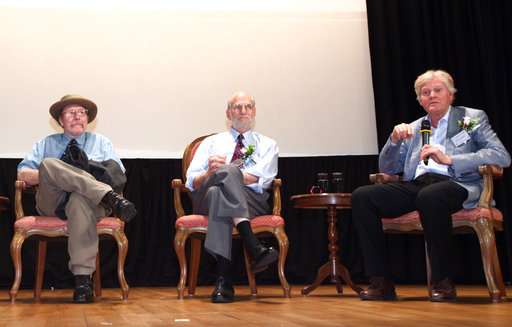
The Latest on the Nobel Prize in Physiology or Medicine (all times local):
6:15 p.m.
At a Rockefeller University news conference in New York, Nobel Prize winner Michael Young said the news of the award came as a shock.
He says "This really did take me by surprise. I had trouble even getting my shoes on this morning."
Young won the Nobel on Monday with fellow Americans Michael Rosbash and Jeffrey Hall for their discoveries about the body's biological clock. He said their research had disclosed "a beautiful mechanism" for how genes controlled body clocks.
Asked about possible medical payoffs from the work, he said "we're just starting with this." But he noted that a genetic mutation has been found in some people who have chronic trouble getting to sleep at night.
Young says this "gives us ways of thinking we didn't have before ... I think we're going to run into this over and over."
——
4:40 p.m.
Jeffrey Hall, 72 wryly noted that he was already awake when he received the call from Sweden about his Nobel Prize in medicine because of changes in his circadian rhythm as he has grown older.
Speaking from his home in rural Cambridge, Maine, he says "I said 'Is this a prank?' I didn't really believe it. I didn't expect it."
Hall won the Nobel on Monday with fellow Americans Michael Rosbash and Michael W. Young for their discoveries about the body's daily rhythms.
Hall said scientists have known about circadian rhythms since the 1700s. He said understanding the mechanics of the circadian rhythm can provide researchers with an opportunity to address circadian rhythm disorders that contribute to sleep problems.
He says "If you understand how the normal process works, that gives you a chance, not an inevitability, but a chance to influence the internal workings of the clock and possibly to improve a patient's well-being."
___
2:20 p.m.
Nobel Medicine winner Michael Rosbash says, at 73, it's usually never good to get a call at 5:09 a.m. on your landline.
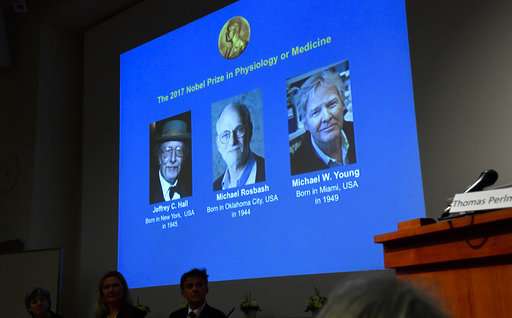
He told The Associated Press on Monday that "when the landline rings at that hour, normally it's because someone died."
Then, on finding out that he had won a Nobel Prize: "I was stunned, shocked."
Rosbash and fellow Americans Jeffrey C. Hall and Michael W. Young won for their discoveries about the body's daily rhythms, opening up whole new fields of research and raising awareness about the importance of getting a good night's sleep.
Rosbash says he started on this work in 1982. He says "I am very pleased. I am very pleased for the field. I am very pleased for the fruit fly. And it is a great thing for the university. I stand on the shoulders of giants. This is a very humbling award."
___
10:30 p.m.
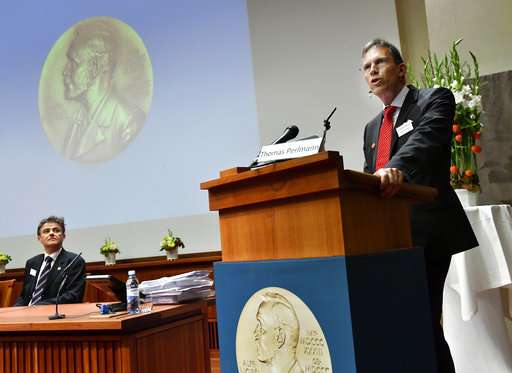
Michael Hastings, a scientist at the U.K. Medical Research Council, said the discoveries by the 2017 Nobel Medicine winners had opened up a whole new field of study for biology and medicine.
"Until then, the body clock was viewed as a sort of black box," Hastings told The Associated Press. "We knew nothing about its operation. But what they did was get the genes that made the body clock, and once you've got the genes, you can take the field wherever you want to."
"It's a field that has exploded massively, propelled by the discoveries by these guys," he told the AP.
Jeffrey C. Hall, Michael Rosbash and Michael W. Young won 9-million-kronor ($1.1 million) prize. Their work stems back to 1984, when Rosbash and Hall, who was then also at Brandeis University, along with Young isolated the "period gene" in fruit flies. Hall and Rosbash found that a protein encoded by the gene accumulated during the night and degraded during daytime. A decade later, Young discovered another "clock gene."
"The paradigm-shifting discoveries by the laureates established key mechanisms for the biological clock," the Nobel Assembly said.
___
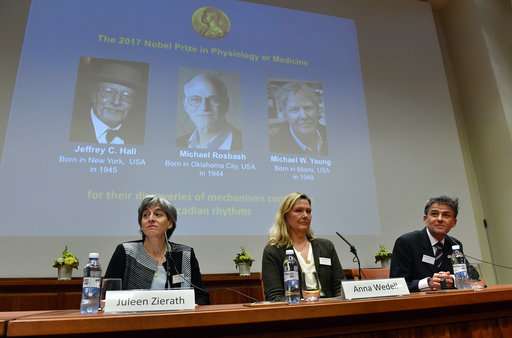
10:30 p.m.
Three Americans won the Nobel Prize in Physiology or Medicine on Monday for their discoveries about the body's daily rhythms, opening up whole new fields of research and raising awareness about the importance of getting proper sleep.
Jeffrey C. Hall, Michael Rosbash and Michael W. Young won 9-million-kronor ($1.1 million) prize for isolating a gene that controls the body's normal daily biological rhythm. Circadian rhythms adapt the workings of the body to different phases of the day, influencing sleep, behavior, hormone levels, body temperature and metabolism.
They "were able to peek inside our biological clock and elucidate its inner workings," the Nobel citation said.
Rosbash is on the faculty at Brandeis University, Young is at Rockefeller University and Hall has been associated with the University of Maine.
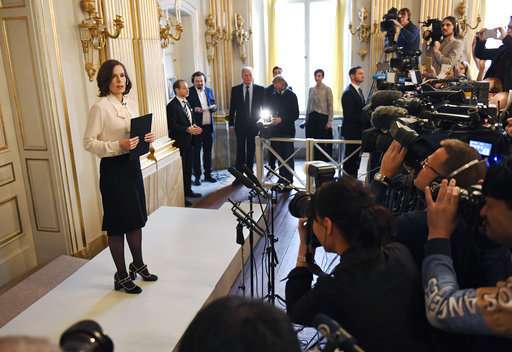
© 2017 The Associated Press. All rights reserved.















